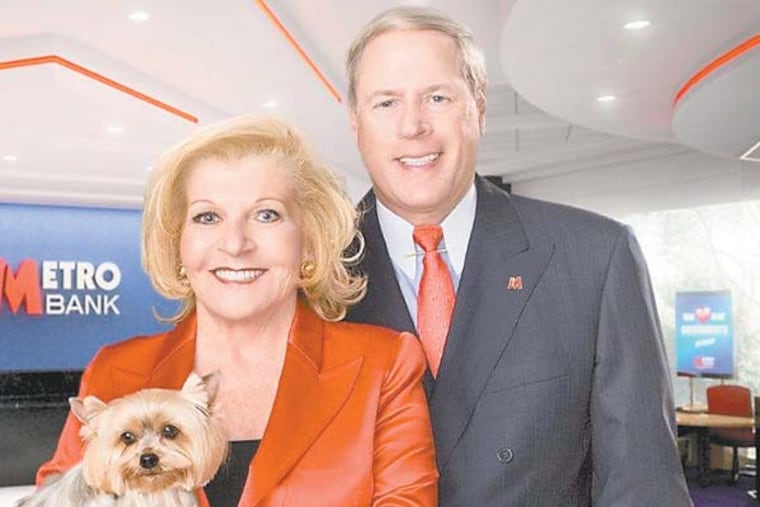Vernon and Shirley Hill settle workers’ pension complaints for $3 million
The Hills will pay for investing workers' money in shares of Vernon Hill's banks.

Vernon Hill, the Moorestown banker, and Shirley Hill, who worked closely with the three banks he ran, have agreed to pay more than $3 million to settle lawsuits over the Hills’ investment of employee retirement savings from InterArch, Shirley Hill’s design company, into Vernon Hill’s bank stocks, which lost most of their value.
The government said in an Aug. 30 federal lawsuit that the Hills concentrated InterArch Profit Sharing Plan’s retirement investments in Metro Bank and Republic First Bancorp during the years 2016 to 2020 and failed to diversify as federal pension law requires, “even as the share prices of both Metro Bank and Republic Bank fluctuated.”
Those stocks eventually lost $21 million in value, from their highest price as part of the plan, until they were sold at deep discounts.
The settlements amount to a fraction of the losses reported by the government. The Hills agreed to pay $1.84 million to members of InterArch Profit Sharing Plan, and $184,000 in penalties, to resolve the federal civil complaint, according to a statement by Cristina O’Brien, the top U.S. Department of Labor official in Philadelphia.
The Hills’ attorney, Jeffrey I. Pasek at Cozen O’Connor, declined to comment. The pair agreed not to contest the Labor Department’s complaint that they broke the law in their management of the plan and “caused financial losses” to its participants.
Shirley Hill will bear much of the loss: Most of the plan’s assets had been set aside by and were invested for her benefit, but she will not collect any of the additional payments. The settlement money will go to 26 other InterArch employees, said Lenore Uddyback-Fortson, a spokesperson for the department.
The Hills also agreed to pay $1.5 million to resolve a private class-action lawsuit on behalf of former InterArch employees, according to the Labor Department.
Before they were sued, the Hills also contributed $1 million to the plan in 2020, again for the benefit of other employees. That means that, together with the settlement funds, the pair will have enriched the depleted plan by more than $4 million since selling off the devalued bank stocks.
In their consent order, the pair also agreed to a ban on serving as pension fiduciaries again, and to appoint a new, independent fiduciary by Sept. 30 to distribute money remaining in the plan and shut it down.
The government had alleged that the couple engaged in self-dealing and violated their duties to the plan by making large, risky investments in Vernon Hill’s banks.
According to the settlement, Shirley Hill was the retirement plan’s only trustee, and she and Vernon Hill both served as fiduciaries, required under federal law to invest the workers’ money for the workers’ best interest, not their own.
The plan was founded in 1976, as Vernon Hill accelerated his expansion of Commerce Bank from a small South Jersey lender into a 400-branch East Coast banking giant.
Commerce was sold to TD Bank in 2008, after Hill had agreed to leave under pressure from regulators and directors. Hill later started Metro, in London, then took over Philadelphia-based Republic First, operator of Republic Bank.
Shirley Hill’s InterArch designed the distinctive look of all three banks, with glass walls, multiple teller stations, bright red letter logos, and other distinctive features that Vernon Hill said were integral to the companies’ success at drawing customers.
Hill was forced out as boss of Republic First Bancorp — the largest bank still based in Philadelphia with more than $5 billion in assets and 36 branches — after losing control of the board of directors following the death of an ally on the board this summer.
Even with Hill gone, the bank remains the object of contention among its largest shareholders. On Friday, a group headed by George Norcross, the South Jersey political fund-raiser, Cooper Health chairman, and insurance broker, offered to buy majority control of the bank and put former TD Bank chief executive Gregory Braca in charge.
Republic First is now run by Hill’s predecessor, Harry Madonna, and has hired consultants to review its strategy and price its possible sale.
Both Norcross’ group and Madonna’s allies had criticized Hill’s ambitious growth plans for the bank, at a time when other lenders have mostly been shutting branches, not opening new ones.
An earlier attempt by the Norcross group to buy control of the bank when it was under Hill’s management last winter was unsuccessful.